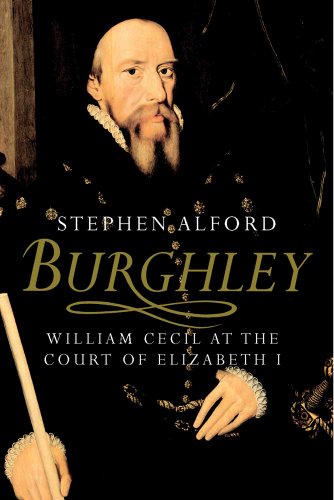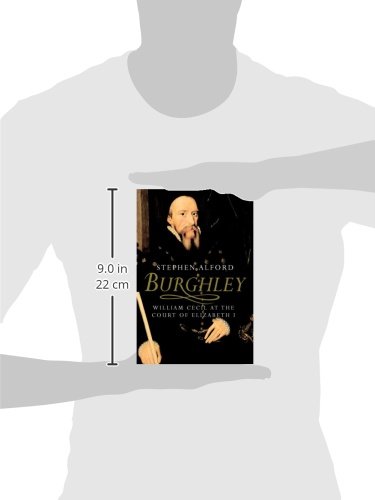


Full description not available
B**R
Burghley brought alive as a person. Good book if you like Tudor history and politics.
As a descendant of William Cecil almost 500 hundred years after he lived, it is exciting to know more about him and read his own written words. What was most amazing to me was the fact that this brilliant man managed to survive the snakepit of tudor politics for over forty years, govern well and thrive. He guided England and its Queen through a golden Age, while founding a powerful dynasty of his own family..
G**P
Five Stars
I thought I was getting a used soft-bound book, but it's hard-bound and new. Very inexpensive.
A**K
Engrossing Book on Elizabeth I's Right Hand Man
I just finished reading Prof. Stephen Alford's tome, "Burghley: William Cecil at the Court of Elizabeth I," and I recommend it for serious 'Elizabethophiles' -- with one significant quibble.On p. 167, Alford argues that Cecil "singlehandedly" ran the secret service and intelligence gathering in the age of Elizabeth I. This is patently untrue, as Sir Francis Walsingham was Elizabeth's spymaster.However, in 2014, Alford corrected this egregious error by producing a splendid little book called "The Watchers: a Secret History of the Reign of Elizabeth I," in which he corrects the record and gives Walsingham due credit.Alford's "Burghley" brims with quotable material, because he uses *primary* sources. So on p. 283, we have Elizabeth's response to Parliament's request that she execute Mary, Queen of Scots. Elizabeth says "[We] princes I tell you are set on stages, in the sight and view of all the world....It behoveth us therefore to be careful that our proceedings be just and honourable." This sense that Renaissance people had of 'the world as a stage' did not originate with Shakespeare -- but he reflected the philosophy of his age with poetic vigour.Cecil was an avid reader, and one of the tutors he kept in his household was Lawrence Nowell. Nowell taught the (thoroughly nasty) Earl of Oxford, but in his spare time, he pored over and attempted to translate "the only surviving original manuscript of 'Beowulf' " (See p. 147). What a scintillating, shimmering household this must have been, with Burghley, his brilliant wife Mildred (nee Cooke), the young Earl of Essex (Robert Devereux), the brothers Bacon (Nicholas and Francis) and a host of Protestant intellectuals.So... buy this book if you love the Elizabethans. Just buy "The Watchers" as well in order to have a balanced view of the espionage activities of the English Renaissance.And kudos to Professor Alford for an engaging biography of one of the seminal personalities of England.
J**T
Very well written
This book was much more enjoyable than I was expecting. William Cecil was quite a facinating character, in fact I had to remind myself more than once that the book was nonfiction. It's obvious that Stephen Alford has spent considerable time and effort gathering the content for this book, but the way it's delivered is what makes it special. Well done!
H**S
Yawn.
Dear me. Scholarship sure ain't what it used to be. Flat and repetitious.
D**I
Disappointing
I agree with Cynthia. The repitition in this book is eye rolling. I was pleased to finally get my hands on a book about Burghley but was hoping for something a little more scholarly than what is presented here by the author. The author provides no evidence for the statements that he makes in the book and views Burghley through very rose coloured glasses. I would like to think that even Burghely himself would be a little embarrased by this.
C**L
Burghley
Unfortunately the author should have taken writing classes before attempting this book. The author repeats himself constantly and has produced a boring book. How one can write about the Elizabethan Era and a main character in that era, Burghley, and come up with this dullness is beyond me.
T**M
Poorly written, rotten on context, and zero drama
I really couldn't get on with this book, try as I might.I found the prose so clunky that it got badly in the way of a fluent read. The author keeps dropping in strange, short statements about Cecil, summarising our man's brilliance. To take an example, chapter 6 begins as follows. "William Cecil came close to treason in the summer of 1553. He had survived by his wits. He had an instinct for survival. He had exceptionally fine judgment. He was able above all to watch his own back. These talents made him the most powerful man in Elizabethan England". To me, this reads like something from a nursery rhyme. Alford might have said, "Will was nimble, Will was quick, Will jumped over the candlestick." At the very least, we seem to be in the Labybird Book of Lord Burghley. Is this how they teach history in Cambridge these days?One of the problems with this style is that because the statements are so facile, they stop you dead in your tracks, wondering why on earth the author is doing this, and then also worrying about when he is going to do it to you again. Which he does. He keeps doing it. Clunk. Clunk. Clunkety clunk. It is really off-putting. What's more, the statements are surprisingly poorly evidenced from the text, and you sometimes start to wonder whether he doesn't really want to go to the trouble of proving his point.The second big problem I had with the book was that it is dire on context. If you don't already have a pretty solid grasp of the period, this book is not going to help you. I think Alford assumes too much not deliberately but without realising he is doing it. There are interesting passages, such as a description of evangelical Cambridge during the period Cecil was there (hence my second star), but they are the exception. The reign of Edward VI was brief, dramatic, and fascinating, but it is not well known. Alford makes no serious attempt to give us a meaningful exposition or overview of it. There is far too of little of the big picture. Why not, for example, outline the reasons for and course of the contest between Somerset and Northumberland? I have heard far better on an amateur historian's podcast.Another obvious example: it was an absolutely astonishing achievement, given the monumental swings in state policy, for Cecil to have been a serious player in the reigns of Edward, Lady Jane Grey, Mary and Elizabeth, and yet Alford conveys very little of how extraordinary his navigation of those tumultuous seas was, or how on earth he managed it. Unless, that is, you count the Ladybird statement quoted above. One disastrous consequence of this is that Alton succeeds in losing all the drama of the story.This really is no way to write the history of one of the central figures in a exceptionally dramatic period of British history. Such a shame.I was deeply disappointed that such a distinguished academic could not do better than this, and I actually feel rather cheated.
B**N
William Cecil
I've read a few books about Lord Burghley but I like to read around a subject and this book fills in the blanks. It's a more personal account of the man and his family, his sense of destiny as he serves both the last male Tudor king, Edward VI and Edward's half-sister, Elizabeth. A very good read ( though I just haven't quite finished it yet!
T**L
Fascinating, and readable
Very readable, and very evidently superbly researched.
A**R
Exactly what I wanted to know.
An excellent read. I looked forward to each page.
S**N
Deeply researched and thoughtful biography of Burghley
Love him or hate him, this book makes clear how powerful a role William Cecil Lord Burghley played in the unfolding politics of Elizabethan England. Alford's research is wide-ranging, thorough, and filled with interesting detail. Alford clearly has an opinion about his subject, but this book is no hagiography. Alford deepened my understanding of Elizabeth's court, and entertained me for several evenings.
Trustpilot
2 weeks ago
2 months ago